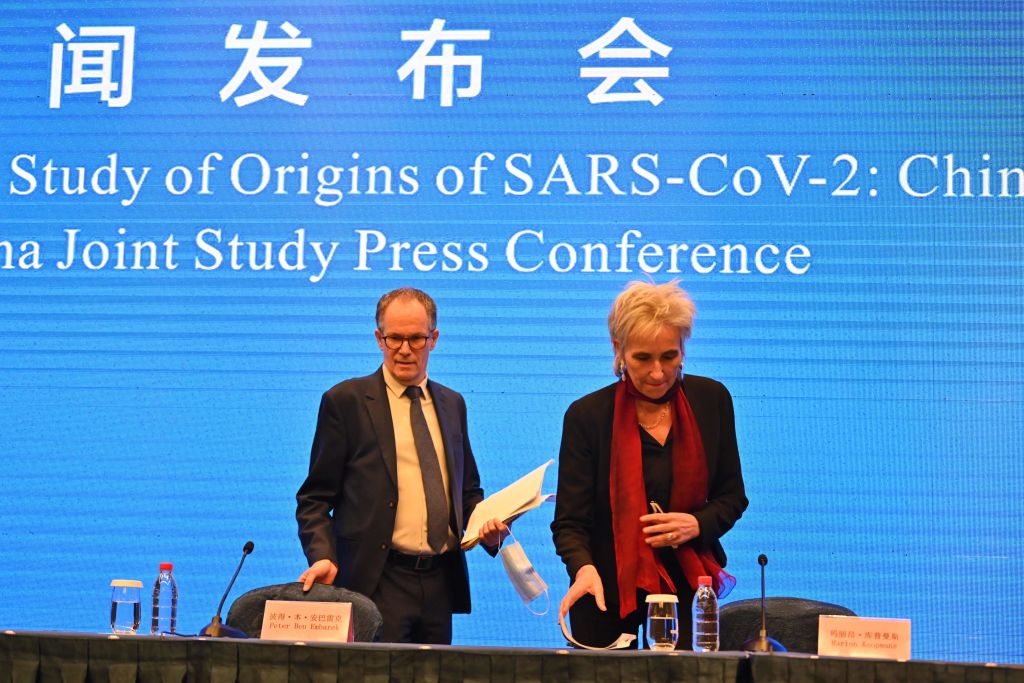WHO-China draft report on COVID-19 origins says Wuhan lab leak 'extremely unlikely'


A free daily email with the biggest news stories of the day – and the best features from TheWeek.com
You are now subscribed
Your newsletter sign-up was successful
The report from the World Health Organization and China on the origins of the COVID-19 pandemic will conclude that the most likely genesis of the new coronavirus was transmission to humans from bats through a second animal, The Associated Press reports, citing what appeared to be a near-final version obtained from an unidentified diplomat Monday. The least likely of the four hypotheses considered was an accidental leak of the virus from a lab in Wuhan, China, that studies coronaviruses in bats, the report found.
Direct transmission of the coronavirus to humans from bats is another likely possibility, though "the evolutionary distance between these bat viruses and SARS-CoV-2 is estimated to be several decades, suggesting a missing link," the draft report says. Very similar viruses have been found in pangolins, the researchers noted, though cats and mink are also potential carriers. The third scenario, "cold-chain" transmission through food products, was deemed possible but unlikely.
The lab leak theory was judged "extremely unlikely," in the report. Dr. Robert Redfield, former director of the U.S. Centers for Disease Control and Prevention, told CNN last week that in his opinion, the lab leak theory is the most likely, adding that "science will eventually figure it out."
The Week
Escape your echo chamber. Get the facts behind the news, plus analysis from multiple perspectives.

Sign up for The Week's Free Newsletters
From our morning news briefing to a weekly Good News Newsletter, get the best of The Week delivered directly to your inbox.
From our morning news briefing to a weekly Good News Newsletter, get the best of The Week delivered directly to your inbox.
The findings in the final draft are consistent with expectations, and Peter Ben Embarek, the WHO expert who led this year's research mission to Wuhan, said Friday he expected the final report to be released to the public in the next few days. "The report's release has been repeatedly delayed, raising questions about whether the Chinese side was trying to skew the conclusions to prevent blame for the pandemic falling on China," AP reports. Read more about the draft findings at The Associated Press.
A free daily email with the biggest news stories of the day – and the best features from TheWeek.com
Peter has worked as a news and culture writer and editor at The Week since the site's launch in 2008. He covers politics, world affairs, religion and cultural currents. His journalism career began as a copy editor at a financial newswire and has included editorial positions at The New York Times Magazine, Facts on File, and Oregon State University.
-
 At least 8 dead in California’s deadliest avalanche
At least 8 dead in California’s deadliest avalancheSpeed Read The avalanche near Lake Tahoe was the deadliest in modern California history and the worst in the US since 1981
-
 Political cartoons for February 19
Political cartoons for February 19Cartoons Thursday’s political cartoons include a suspicious package, a piece of the cake, and more
-
 The Gallivant: style and charm steps from Camber Sands
The Gallivant: style and charm steps from Camber SandsThe Week Recommends Nestled behind the dunes, this luxury hotel is a great place to hunker down and get cosy
-
 Trump HHS slashes advised child vaccinations
Trump HHS slashes advised child vaccinationsSpeed Read In a widely condemned move, the CDC will now recommend that children get vaccinated against 11 communicable diseases, not 17
-
 FDA OKs generic abortion pill, riling the right
FDA OKs generic abortion pill, riling the rightSpeed Read The drug in question is a generic version of mifepristone, used to carry out two-thirds of US abortions
-
 RFK Jr. vaccine panel advises restricting MMRV shot
RFK Jr. vaccine panel advises restricting MMRV shotSpeed Read The committee voted to restrict access to a childhood vaccine against chickenpox
-
 Texas declares end to measles outbreak
Texas declares end to measles outbreakSpeed Read The vaccine-preventable disease is still spreading in neighboring states, Mexico and Canada
-
 RFK Jr. shuts down mRNA vaccine funding at agency
RFK Jr. shuts down mRNA vaccine funding at agencySpeed Read The decision canceled or modified 22 projects, primarily for work on vaccines and therapeutics for respiratory viruses
-
 Measles cases surge to 33-year high
Measles cases surge to 33-year highSpeed Read The infection was declared eliminated from the US in 2000 but has seen a resurgence amid vaccine hesitancy
-
 Kennedy's vaccine panel signals skepticism, change
Kennedy's vaccine panel signals skepticism, changeSpeed Read RFK Jr.'s new vaccine advisory board intends to make changes to the decades-old US immunization system
-
 Kennedy ousts entire CDC vaccine advisory panel
Kennedy ousts entire CDC vaccine advisory panelspeed read Health Secretary RFK Jr. is a longtime anti-vaccine activist who has criticized the panel of experts
